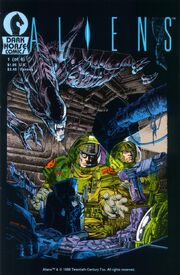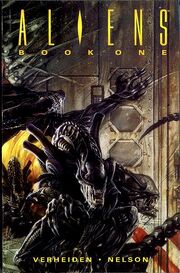Leigh Burne (talk | contribs) Tag: sourceedit |
Leigh Burne (talk | contribs) Tag: sourceedit |
||
| Line 88: | Line 88: | ||
*''[[Aliens: Once in a Lifetime]]'' (Feb 1999) |
*''[[Aliens: Once in a Lifetime]]'' (Feb 1999) |
||
*''[[Aliens: Xenogenesis]]'' (Aug-Nov 1999) |
*''[[Aliens: Xenogenesis]]'' (Aug-Nov 1999) |
||
| − | * |
+ | *[[Aliens (series 3)|''Aliens'' (series 3)]] (May-Dec 2009) aka ''Aliens: More Than Human'' |
*''[[Aliens: Colonial Marines (2012 comic)|Aliens: Colonial Marines]]'' (July 2012) |
*''[[Aliens: Colonial Marines (2012 comic)|Aliens: Colonial Marines]]'' (July 2012) |
||
*''[[Alien: Isolation (comic)|Alien: Isolation]]'' (July 2014) |
*''[[Alien: Isolation (comic)|Alien: Isolation]]'' (July 2014) |
||
Revision as of 11:51, 27 March 2015
Template:DarkHorse

Cover to Aliens issue 1, 1988

Cover to Aliens: Book One, 1st collected edition
The Aliens comic book line is a long-running series of comic books published by Dark Horse Comics based on the Alien franchise, chiefly the 1986 film Aliens. The line has included a number of limited series, one-shots and short stories, starting with the original Aliens comic in July 1988.
Overview
According to the company's editors, Dark Horse Comics decided early on to compose the line as a series of miniseries, one-shots and short stories, rather than a continuing unlimited series, in order to continually allow for new creative blood and the freedom to change creative direction; to avoid the need for filler issues or creative staleness; and to accommodate for possible/inevitable scheduling delays between series.
The series began as an immediate continuation of the story after James Cameron's Aliens; the first two comics series (originally titled simply Aliens, later titled Aliens: Book One and Aliens: Book Two in collected form) featured the characters of Newt and Corporal Hicks as their main protagonists, while the third, Aliens: Earth War, additionally reintroduced Alien-franchise heroine Lieutenant Ellen Ripley. These series dealt with a Xenomorph infestation on Earth, one of the central developments of the Aliens comics series.
However, following the release of the film Alien3, which featured the deaths of Newt, Hicks and Ripley, Dark Horse edited the existing Aliens comics in order to keep the events and stories within relevant to the Alien universe. The names and identities of its key characters were changed — Newt became Billie, Hicks became Wilks, and Ripley became a synthetic version of herself. The stories were also retitled in reprint editions to their current names: Aliens: Outbreak, Aliens: Nightmare Asylum and Aliens: The Female War.
The effects of the Xenomorph infestation on Earth would continue to play a prominent or background role in all subsequent Aliens comics, but starting with the fourth miniseries (Aliens: Genocide), the stories would come to focus on new characters and events in the Aliens universe.
Dozens of Aliens stories would follow featuring work from top names in the comic book industry and incorporating a wide variety of artistic styles, from black and white, to painted airbrush, to typical comic book-style illustration. This lasted until 1999's Aliens: Xenogenesis, when the series entered a ten-year hiatus. In 2009, Dark Horse Comics relaunched its Aliens line with a new limited series.
Common themes
Aliens comics stories are usually set in the same late 22nd century future as the first three movies of the Alien film series and often feature the company Weyland-Yutani (or some other interplanetary corporate entity) and the United States Colonial Marine Corps, as seen in the Alien films. Other themes common to the series include a continued description of the future of human civilization, space colonization and mining, horror stories, and the continued experimentation on the Xenomorph species by rogue scientists. Corporate greed, the dangers of unchecked scientific ambition and a struggle for survival are usually involved. The stories are often used to explore new characters and other aspects of the Xenomorph species, such as their sociology and biology.
Despite the typical future setting, some stories have been set in other time periods, depicting Xenomorph outbreaks at different points in human history.
Creation of the Aliens vs. Predator Universe
A number of different comics have been published based on the Alien, Predator and Alien vs. Predator franchises, all published by Dark Horse, or by Dark Horse in collaboration with another publishing company in the case of the numerous cross-over stories with other famous comic book lines. With the exception of the cross-over stories, all of these stories are generally thought to take place in the same, connected fictional universe. This was not, at first, the case.
However, a year after the release of the first Aliens mini-series in 1988, Dark Horse laid the foundation for connecting the Aliens franchise with the Predator franchise, which they had also acquired the rights to and upon which they had been basing comics since June 1989.
In 1989, in the company's anthology series Dark Horse Presents, issue #34 featured an Alien story, issue #35 featured a Predator story, and issue #36 featured the first Aliens vs. Predator story. The three-part story served as a prequel to the first full-fledged Aliens vs. Predator mini-series, which followed shortly (all three stories combined were later released as Aliens vs. Predator). Since that time Dark Horse has concurrently produced all three titles.
With the 2004 release of the film Alien vs. Predator, the merger of the franchises and their continuities was even more firmly established.
Aliens Comics
- Heavy Metal Presents Alien: The Illustrated Story (1979, not part of Dark Horse's Aliens series)
- Aliens (series 1) (July 1988-July 1989) aka Aliens: Book One and Aliens: Outbreak
- Aliens: Theory of Alien Propagation (Nov 1988)
- Aliens (series 2) (Aug 1989-May 1990) aka Aliens: Book Two and Aliens: Nightmare Asylum
- Aliens: Earth War (June-Oct 1990) aka Aliens: The Female War
- Aliens: Advent/Terminus (July-Aug 1990)
- Aliens: Countdown (Sept 1990-Dec 1991)
- Aliens: Reapers (April 1991)
- Aliens: The Alien (Nov 1991)
- Aliens: Genocide (Nov 1991-Feb 1992)
- Aliens: Hive (Feb-May 1992)
- Dark Horse Presents: Aliens Platinum Edition (April 1992)
- Aliens: Tribes (April 1992)
- Aliens: Newt's Tale (June-July 1992)
- Alien3 (June-July 1992)
- Aliens: Renegade (Aug-Sept 1992) aka Renegade
- Aliens: Horror Show (Oct-Dec 1992)
- Aliens: Colonial Marines (Jan 1993-July 1994)
- Aliens: Countdown (March-April 1993, UK mini-comic reprint)
- Aliens: Rogue (April-July 1993)
- Aliens: Sacrifice (May 1993)
- Aliens: Taste (July 1993)
- Aliens: Crusade (July 1993-March 1994, incomplete)
- Aliens: Backsplash (Aug-Sept 1993)
- Aliens: Labyrinth (Sept 1993-Jan 1994)
- Aliens: Salvation (Nov 1993)
- Aliens: Cargo (Nov-Dec 1993)
- Aliens: Alien (Jan-Feb 1994)
- Aliens: Music of the Spears (Jan-April 1994)
- Aliens: Matrix (May 1994, never released)
- Aliens: Stronghold (May-Sept 1994)
- Aliens: Mondo Pest (June-Aug 1994, original serialization)
- Aliens: Earth Angel (Aug 1994)
- Aliens: Berserker (Jan-April 1995) aka Aliens: Frenzy
- Aliens: Mondo Pest (April 1995, collected version)
- Aliens: Incubation (Sept-Oct 1995)
- Aliens: Mondo Heat (Feb 1996)
- Aliens: Lucky (Sept 1996)
- Aliens: Lovesick (Dec 1996)
- Aliens: Headhunters (Jan 1997)
- Aliens: Pig (March 1997)
- Aliens: Border Lines (May 1997)
- Aliens: Special (June 1997)
- Aliens: Havoc (June-July 1997)
- Aliens: Purge (Aug 1997)
- Aliens: Alchemy (Sept-Dec 1997)
- Alien Resurrection (Oct-Nov 1997)
- Aliens: Kidnapped (Dec 1997-Feb 1998)
- Aliens: Tourist Season (Feb 1998)
- Aliens: Survival (Feb-April 1998)
- Aliens: Glass Corridor (June 1998)
- Aliens: Stalker (June 1998)
- Aliens: Wraith (July 1998)
- Aliens: Apocalypse - The Destroying Angels (Jan-May 1999)
- Aliens: Once in a Lifetime (Feb 1999)
- Aliens: Xenogenesis (Aug-Nov 1999)
- Aliens (series 3) (May-Dec 2009) aka Aliens: More Than Human
- Aliens: Colonial Marines (July 2012)
- Alien: Isolation (July 2014)
- Aliens: Fire and Stone (Sept-Dec 2014)
Omnibus editions
- Aliens Omnibus: Volume 1 (July 2007)
- Aliens Omnibus: Volume 2 (Dec 2007)
- Aliens Omnibus: Volume 3 (March 2008)
- Aliens Omnibus: Volume 4 (July 2008)
- Aliens Omnibus: Volume 5 (Oct 2008)
- Aliens Omnibus: Volume 6 (Dec 2008)
Crossover comics
- Superman vs. Aliens (July-Sept 1995) aka Superman/Aliens
- Batman/Aliens (March-April 1997)
- WildC.A.T.s/Aliens (Aug 1998)
- Green Lantern versus Aliens (Sept-Dec 2000)
- Batman/Aliens II (Dec 2002-Feb 2003)
- Superman/Aliens II: God War (May-Dec 2002)
- Judge Dredd vs. Aliens: Incubus (March-June 2003)
Publication Information
The following is publication information for most of the collected editions and stories in the Aliens and AVP lines. All collections are originally published by Dark Horse Comics and UK edition reprints are licensed to Titan Books.
- Aliens:
- Aliens 1-6 (aka Aliens Book 1 & Outbreak, by Mark Verheiden and Mark A. Nelson, Dark Horse, 176 pages, 1989, ISBN 1-56971-164-X, 1996, ISBN 1-56971-174-7, Titan Books, 1990, ISBN 1-85286-276-9, 1996, ISBN 1-85286-756-6)
- Aliens 1-4 (aka Aliens Book 2 & Nightmare Asylum, by Mark Verheiden, Denis Beauvais and Mark A. Nelson, Dark Horse, 112 pages, 1990, ISBN 1-878574-03-5, Titan Books, 1991, ISBN 1-85286-378-1, 1997, ISBN 1-85286-765-5)
- Aliens: Earth War 1-4 (aka Aliens Book 3 & Female War, by Mark Verheiden and Sam Kieth, Dark Horse, 176 pages, 1991, ISBN 1-878574-23-X)
- Aliens: Rogue (by Ian Edginton and Will Simpson, Dark Horse, 112 pages, 1993, 1994, trade paperback, 1995, ISBN 1-56971-023-6)
- Aliens: Hive (by Jerry Prosser and Kelley Jones, Dark Horse, 128 pages, 1997, Titan Books, 1993, ISBN 1-85286-469-9, Dark Horse, ISBN 1-56971-122-4)
- Aliens: Labyrinth (by Jim Woodring and Kilian Plunkett, Dark Horse, 136 pages, trade paperback, Titan Books, 1997, ISBN 1-85286-844-9)
- Aliens: Genocide (by John Arcudi, Damon Willis and Karl Story, Dark Horse tpb, 112 pages, ISBN 1-56971-196-8, Titan Books, 1997, ISBN 1-85286-805-8)
- Aliens: Purge (by Ian Edginton, Phil Hester and Ande Parks, Dark Horse, 88 pages, 1997, 1999, tpb, ISBN 1-56971-409-6)
- Aliens: Pig (by Chuck Dixon, Henry Flint and Andrew Pepoy, Dark Horse, one-shot comic book, 1997)
- Aliens: Xenogenesis (by Tom Bierbaum/Mary Bierbaum, Dave Ross and Andrew Pepoy, Dark Horse, 4-issue mini-series, 1999)
- Aliens: Apocalypse - The Destroying Angels (by Mark Schultz and Doug Wheatley, Dark Horse, 4-issue mini-series, 1999, trade paperback, 96 pages, 1999, ISBN 1-56971-399-5)
- Aliens Omnibus:
- Volume 1 (collects Outbreak, Nightmare Asylum, and Female War, 384 pages, July 2007, ISBN 1593077270)[1]
- Volume 2 (collects Genocide, Harvest and Colonial Marines, 448 pages, December 2007, ISBN 1-59307-828-5)[2]
- Volume 3 (collects Rogue, Labyrinth, Sacrifice and Salvation, 376 pages, March 2008, ISBN 1-59307-872-2)[3]
- Volume 4 (collects Music of the Spears, Stronghold, Frenzy (Berserker), Taste, Mondo Pest, Mondo Heat, 376 pages, July 2008, ISBN 1-59307-926-5)[4]
- Volume 5 (collects Alchemy, Kidnapped, Cargo, Survival, Alien, Earth Angel, Incubation, Havoc, Lovesick, Lucky, 364 pages, November 2008, ISBN 1-59307-991-5)[5]
- Volume 6 (collects Apocalypse, Xenogenesis, Head Hunters, Tourist Season, Pig, Border Lines, the Aliens: Special, Purge, Glass Corridor, Stalker, Wraith, Once in a Lifetime, 376 Pages, December 2008, ISBN 1-59582-214-3) [6]
See Also
External Links
References
- ↑ Dark Horse Comics > Profile > Aliens Omnibus Volume 1
- ↑ Dark Horse Comics > Profile > Aliens Omnibus Volume 2
- ↑ Dark Horse Comics > Profile > Aliens Omnibus Volume 3
- ↑ Dark Horse Comics > Profile > Aliens Omnibus Volume 4
- ↑ Dark Horse Comics > Profile > Aliens Omnibus Volume 5
- ↑ Dark Horse Comics > Profile > Aliens Omnibus Volume 6
